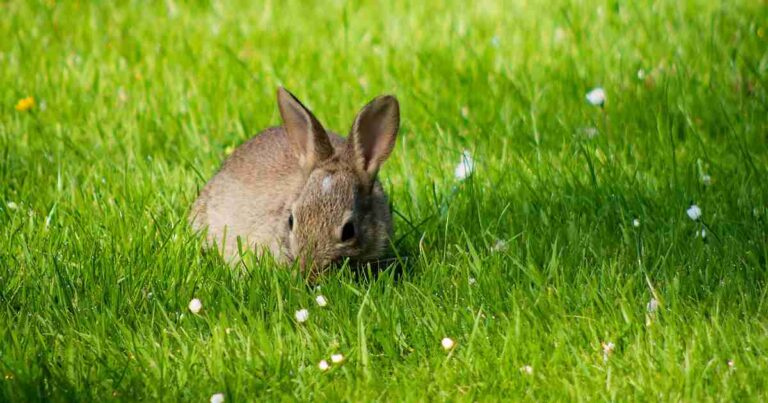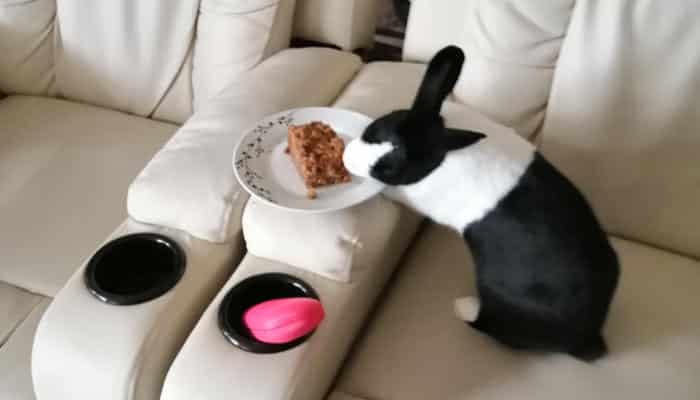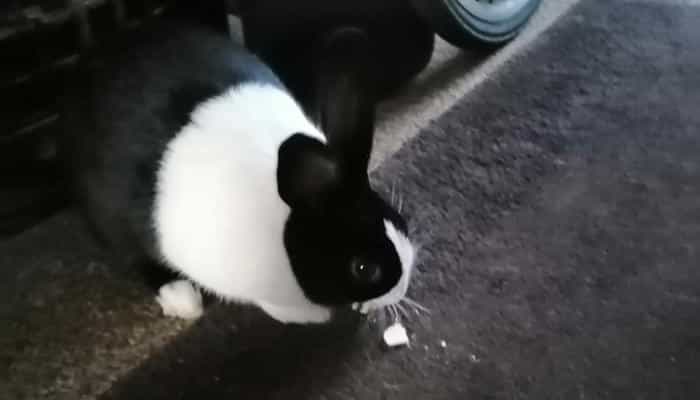Introduction
Feeding rabbits the diet nature gave their digestive system to process, is fundamental to your rabbit’s health. While feeding them by common belief, will cause them to suffer and shorten their lives. So, in this post we will explore the wild rabbits diet, and their digestion of raw fibre. Before discussing feeding pet rabbits the recommended diet, in more depth, and feeding treats while maintaining a balanced diet.
Table of Contents
Feeding Rabbits: So What do Wild Rabbits Eat?
We should all know that our pet rabbits ancestors, the European wild rabbit’s staple diet, is grass. In fact, grass forms 85 to 90% of its diet. With only the odd wild herb, roots, tree bark and other tasty foliage thrown in.
Rabbits are hindgut fermenters that use caecotrophy. Which relies on a colony of helpful, breaking down their natural diet by fermentation. While keeping all other bacteria in check. So, a wild rabbits diet supports the helpful bacteria, and maintains the balance in the gut.
Rabbits digestive systems can easily be upset just by eating an unnatural food, or too little grass. Because grass is high in the raw fibre, on which a rabbit’s digestive system depends. So, to keep a healthy gut, a wild rabbit needs to eat a minimum of 85% grass.
Raw Fibre and its digestion
Raw fibre is a combination of insoluble fibre, that aids the passage of food through the gut. And soluble fibre, that bacteria in the caecum ferments to extract the nutrients. Which then exits via the anus, as caecotrophs. Finally, the rabbit eats its caecotrophs to fully digest and absorb the nutrients they hold. Including all the carbohydrates they need, and you should never include them in their diet.
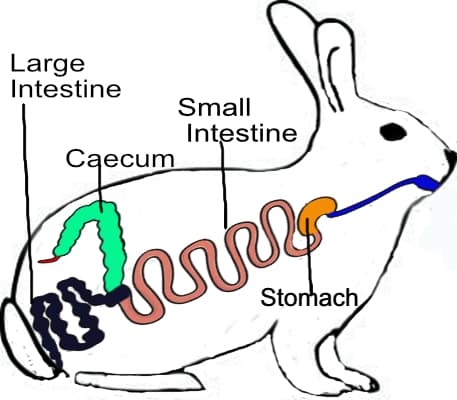
Because most nutrients in caecotrophs, rabbits absorb through the wall of the small intestine. So, do not return to the caecum. However, carbohydrates, of which natural sugar is one, fed to rabbits, will pass through the caecum. Causing the wrong bacteria to take over, stopping the normal function of the gut, and the rabbit eating. Hence, without urgent veterinary help, your bunny will suffer and die.
Feeding pet rabbits a natural diet
So, a wild rabbit’s diet is boringly uncomplicated, but precisely what it needs for a healthy life. Hence, they could live for around ten years on that essential diet. However, a wild rabbit’s average lifespan is only three years, mainly because of disease and its predators. Now, we have given the wild European rabbits just what they need to have a long, healthy life. Waved the magic wand of selective breeding to alter their appearance, and hey presto, we have our pet rabbits.
But all that has changed is their outward appearance. Hence, our pet’s dietary needs are precisely the same as its wild ancestors! So why when owning a rabbit do we then complicate a simple thing like feeding and shorten their lives again? The answer is because we are human, with a digestion, able to cope with a wide variety of foods. Whereas, a rabbit is one of nature’s athletes that runs on raw fibre.
feeding pet rabbits – the recommended rabbit diet
Unfortunately, feeding our bunnies the diet of their wild ancestors is totally impractical. However, the recommended diet of hay and water with a small handful of leafy greens and a few nuggets daily. Is correct, even if it appears to be vague. But rabbits, like humans, are individuals and their diets need balancing separately. So let’s explore feeding rabbits in a little more depth.
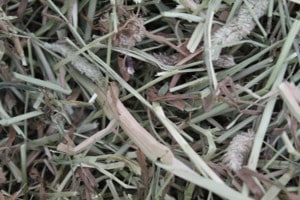
Feeding Hay
Rabbits need access to a fresh constant supply of feeding hay, or dried grass, but preferably both. Drying grass naturally, as in hay, or artificially, as in dried grass, does not affect the fibre content. Which in grass varies between 20 and30%. The problem with hay is the quality, which depends on many factors, including the soil and weather. Most rabbits are fussy about their hay and its quality. So if it’s not to their liking will not eat it, or eat less. However, they do like munching the long stalks in hay. Whereas, the consistent quality of dried grass ensures they eat enough raw fibre.
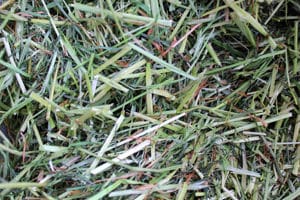
Dried Grass
Grass, cut at an optimum growth and then dried under a low temperature heat. The low heat extracts only the water from the grass, while retaining the nutritional value, and colour. Then packing it to keep it fresh and dry. Provides a viable alternative to hay with a consistent quality. I’ve been feeding pet rabbits Babe and Bob dried grass for two years. Because they readily eat it with less waste. Hence, I don’t have to search for feeding hay they will actually eat. However, I still provide hay in their litter tray, mixed with a handful of dried grass, for them to forage. While their primary source of grass, I feed in bowls not large enough for them to use as a toilet.
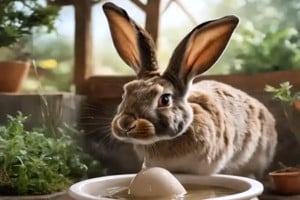
Water
The moisture in the grass that wild rabbits eat, provides most of their daily need for water. But rabbits eating dried foods, need a constant source of fresh drinking water, to digest their food and prevent dehydration. But rabbits have difficulty drinking enough from a drinking bottle. So, I provide fresh water daily in a small ceramic dog bowl, which prevents rabbits tipping it over. In fact, the only one that has upset it is me.
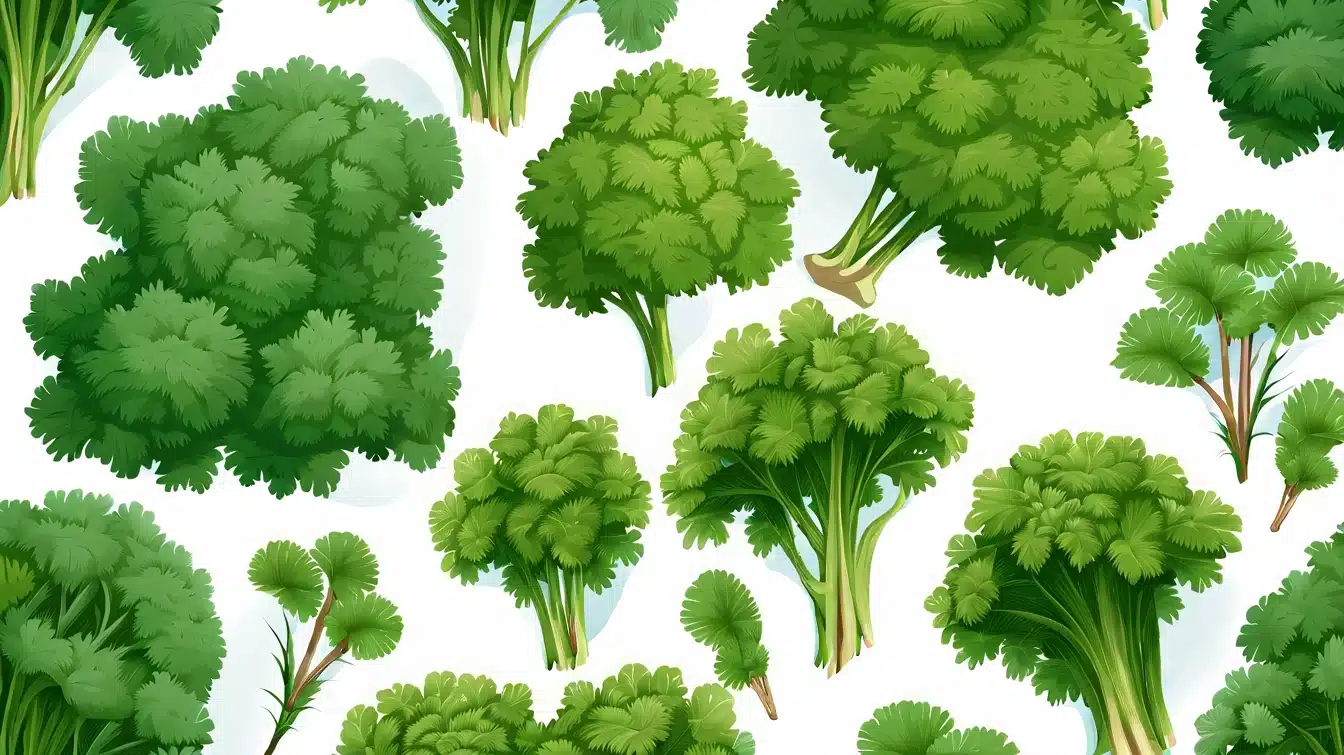
Leafy Greens
Feeding a small amount of leafy greens adds some variety to their diet. While helping to replace vitamins their diet may lack. But you must check they are safe for rabbits to eat, and only feed a small handful daily. There’s a wide range of safe leafy greens, both cultivated and wild, available. However, feeding a variety of broccoli florets, kale, (flat leaved and curly), spring greens, coriander, parsley, and mint. Will give your bunnies a healthy start.
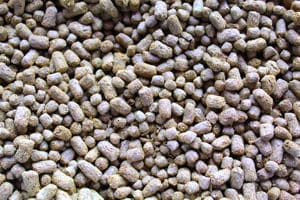
Nuggets
Nuggets are for supplementing your rabbits diet, with essential minerals missing from its hay. The amount of nuggets you feed, must be a judgment call on your part! Start small; it is better to give too little than too much, and not all at once. Hence, I'm currently feeding nuggets with an analytical content of 40.5% beneficial fibre and 21% raw/crude fibre.
The rabbit diet and minerals
As you do not know, the exact minerals and their quantities in your rabbits diet. While supplementing them with nuggets in a young bunny, will not cause problems. Because the kidneys filter any excess minerals, which then pass out of the body via their urine. But, in an adult, an excess of calcium over a prolonged period can cause kidney damage.
Now most of a rabbits food contains varying amounts of calcium. For this reason, the recommended diet advises small amounts of nuggets and leafy greens. For example, grass the wild rabbits staple diet, and hay contain between 0.3% and 0.5% calcium. With between 20% and 25% raw / crude fibre. Hence, small amounts of nuggets with a low calcium and high fibre content. Found in the analytical content, will help keep the calcium and fibre in their diet within natural limits.
However, with leafy greens, the simple solution is not feeding too many. Because they are very low in fibre and vary widely in calcium content. Which depends on the variety, where they grew and the weather. So, over feeding leafy greens will not only increase the calcium. But can also cause your bunny to eat less hay/grass, reducing the raw fibre in its diet.
Feeding Rabbits – Balancing The Diet
What you feed in to one end, passes through the digestive system. Therefore, it’s what comes out the other end that helps us to balance their diet. So, feeding rabbits is a balancing act based on their droppings. Their poo should be round, firm and never soft, fibrous brown balls, no smaller than a garden pea.
Small poo shows you are overfeeding low fibre foods. Too many leafy greens and treats, causing your rabbit to eat less hay or grass. While finding uneaten caecotrophs, or worse, your rabbit has a sticky bottom, shows you are feeding too many nuggets. Feed less.
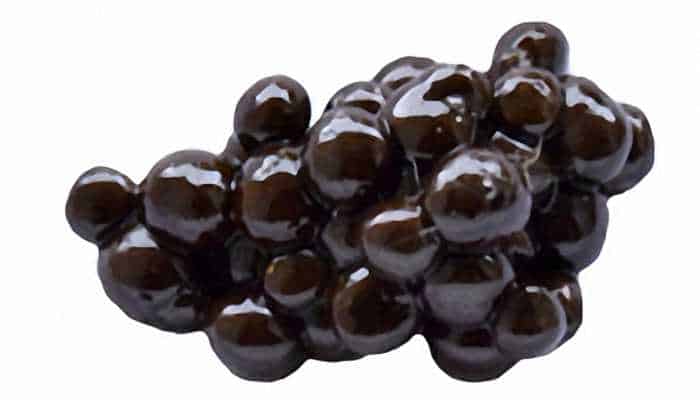
However, sudden changes in diet can upset the balance, and cause your bunny serious digestive problems. Whereas, making changes, or adding something new gradually, over 10 to14 days, transitioning, will avoid complications.
Feeding Rabbits – Treats
Humans like to treat themselves and their pets, but treating your rabbit is where the problems can start. The answer to your question is yes; I give Babe and Bob treats. After all, I am human despite the rumours. But joking aside, they are only little healthy treats.
Unfortunately, rabbits have a sweet tooth. They love anything they should not have; carrots, soft fruit and my homemade fruit cake! No, I am not joking; I’ve caught Babe pinching my fruit cake, and liquorice all sorts. Here is the photographic proof!
Fortunately, she didn’t have the time to eat enough to cause a serious problem! But giving treats by hand, is useful in maintaining the bond with their owners. They just need to be safe for bunnies to eat, and form part of their normal diet.
For example. Babe and Bob’s diet includes small amounts of Coriander, Parsley, Mint and Kale, that are fed by hand as treats. You can also give nuggets that are part of their daily diet as treats by hand. The result of which is contented rabbits that are not overfed with unhealthy treats.
conclusion
In this post, we have discussed the ancestors of our pet bunnies. They are hindgut fermenters and practice caecotrophy. The only difference between them and our pets is their appearance. Rabbits require a high fibre diet to maintain gut health. We have also learned how feeding pet this diet helps keep their gut balanced and healthy. the excess calcium. Lastly, we discussed the importance of giving treats within the recommended diet.

